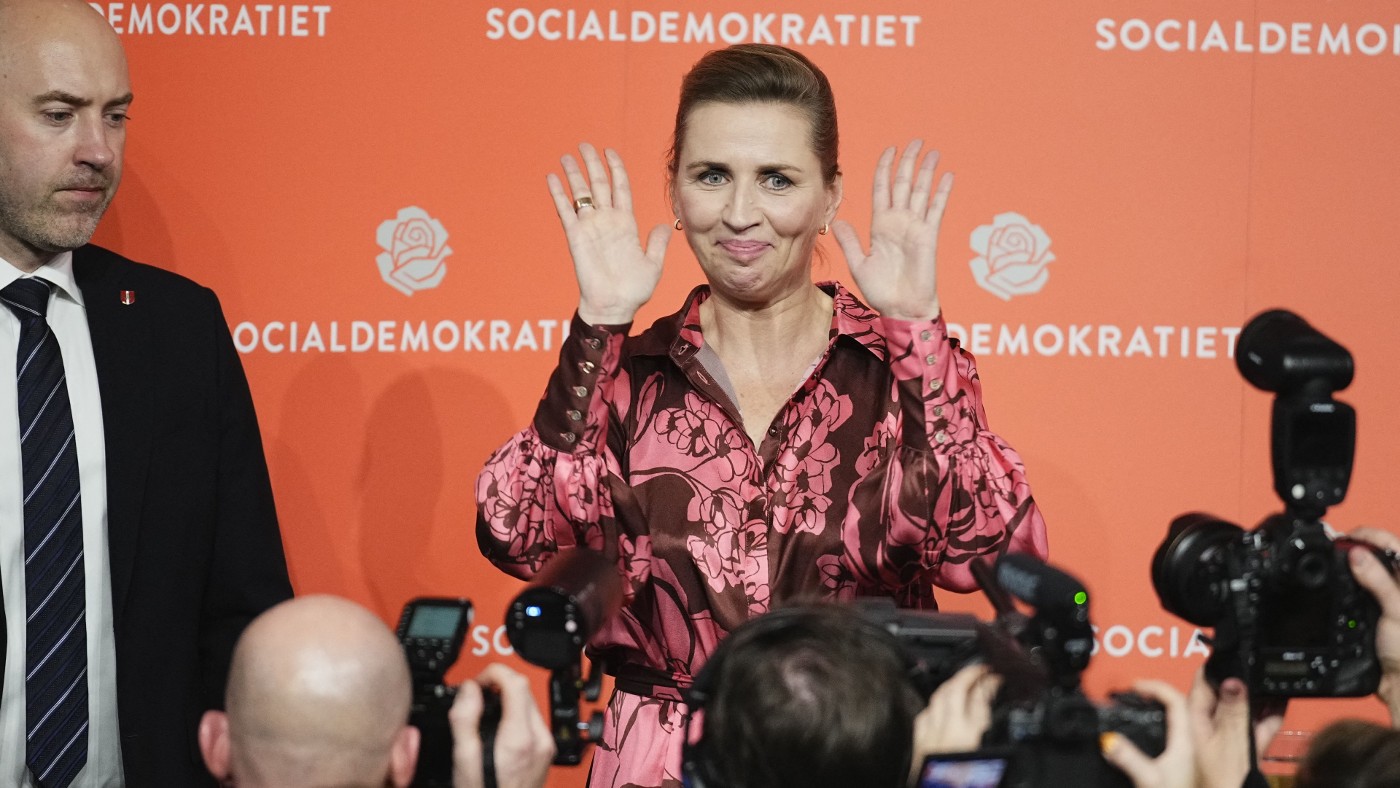Social Democrats cling on to power in Denmark
Incumbent PM Mette Frederiksen wants to form a broad coalition of centrist parties

A free daily email with the biggest news stories of the day – and the best features from TheWeek.com
You are now subscribed
Your newsletter sign-up was successful
Denmark’s centre-left will retain a slim majority in parliament after a general election widely regarded as a confidence vote in the nation’s leader.
Following a “nail-biting count”, the Social Democrats are clinging to power after taking 28% of votes, said Politico, paving the way for another term for the incumbent prime minister, Mette Frederiksen.
Her bloc won precisely the 90 seats needed for a majority, thanks to three mandates from Greenland and the Faroe Islands. “Social democracy had its best election in over 20 years,” Frederiksen said in a speech during her election-night party in the capital, Copenhagen.
The Week
Escape your echo chamber. Get the facts behind the news, plus analysis from multiple perspectives.

Sign up for The Week's Free Newsletters
From our morning news briefing to a weekly Good News Newsletter, get the best of The Week delivered directly to your inbox.
From our morning news briefing to a weekly Good News Newsletter, get the best of The Week delivered directly to your inbox.
However, noted the BBC, she wants to form a “broader coalition” and has tendered the government’s resignation to the queen.
Frederiksen was originally forced to call an early election in October amid an outcry over her government’s handling of a country-wide mink cull at fur farms during the Covid pandemic. A report found that the government’s order to kill up to 17 million mink in 2020 had no legal basis.
Danish politics has previously “stuck strictly to separate left- and right-wing blocs that have taken turns in governing”, said the Financial Times, but Frederiksen has said she would like to see a centrist government involving the main parties from both the left and right, to minimise the influence of extremist parties.
Nevertheless, said New Statesman, a “close election and a shifting political landscape isn’t likely to change the country’s anti-immigration policies” because “there is a broad anti-immigration consensus in Danish politics”, including from Frederiksen, who declared in 2019 that she wanted her country to accept “zero” asylum seekers.
A free daily email with the biggest news stories of the day – and the best features from TheWeek.com
Writing for Al Jazeera, Somdeep Sen said “a range of anti-immigrant and anti-asylum laws” and an “increasingly xenophobic political discourse” have made him feel “unwelcome” in Denmark.
-
 Jeff Bezos: cutting the legs off The Washington Post
Jeff Bezos: cutting the legs off The Washington PostIn the Spotlight A stalwart of American journalism is a shadow of itself after swingeing cuts by its billionaire owner
-
 5 blacked out cartoons about the Epstein file redactions
5 blacked out cartoons about the Epstein file redactionsCartoons Artists take on hidden identities, a censored presidential seal, and more
-
 How Democrats are turning DOJ lemons into partisan lemonade
How Democrats are turning DOJ lemons into partisan lemonadeTODAY’S BIG QUESTION As the Trump administration continues to try — and fail — at indicting its political enemies, Democratic lawmakers have begun seizing the moment for themselves
-
 Greenland’s capital becomes ground zero for the country’s diplomatic straits
Greenland’s capital becomes ground zero for the country’s diplomatic straitsIN THE SPOTLIGHT A flurry of new consular activity in Nuuk shows how important Greenland has become to Europeans’ anxiety about American imperialism
-
 Epstein files topple law CEO, roil UK government
Epstein files topple law CEO, roil UK governmentSpeed Read Peter Mandelson, Britain’s former ambassador to the US, is caught up in the scandal
-
 Iran and US prepare to meet after skirmishes
Iran and US prepare to meet after skirmishesSpeed Read The incident comes amid heightened tensions in the Middle East
-
 Israel retrieves final hostage’s body from Gaza
Israel retrieves final hostage’s body from GazaSpeed Read The 24-year-old police officer was killed during the initial Hamas attack
-
 China’s Xi targets top general in growing purge
China’s Xi targets top general in growing purgeSpeed Read Zhang Youxia is being investigated over ‘grave violations’ of the law
-
 Panama and Canada are negotiating over a crucial copper mine
Panama and Canada are negotiating over a crucial copper mineIn the Spotlight Panama is set to make a final decision on the mine this summer
-
 Europe moves troops to Greenland as Trump fixates
Europe moves troops to Greenland as Trump fixatesSpeed Read Foreign ministers of Greenland and Denmark met at the White House yesterday
-
 Why Greenland’s natural resources are nearly impossible to mine
Why Greenland’s natural resources are nearly impossible to mineThe Explainer The country’s natural landscape makes the task extremely difficult